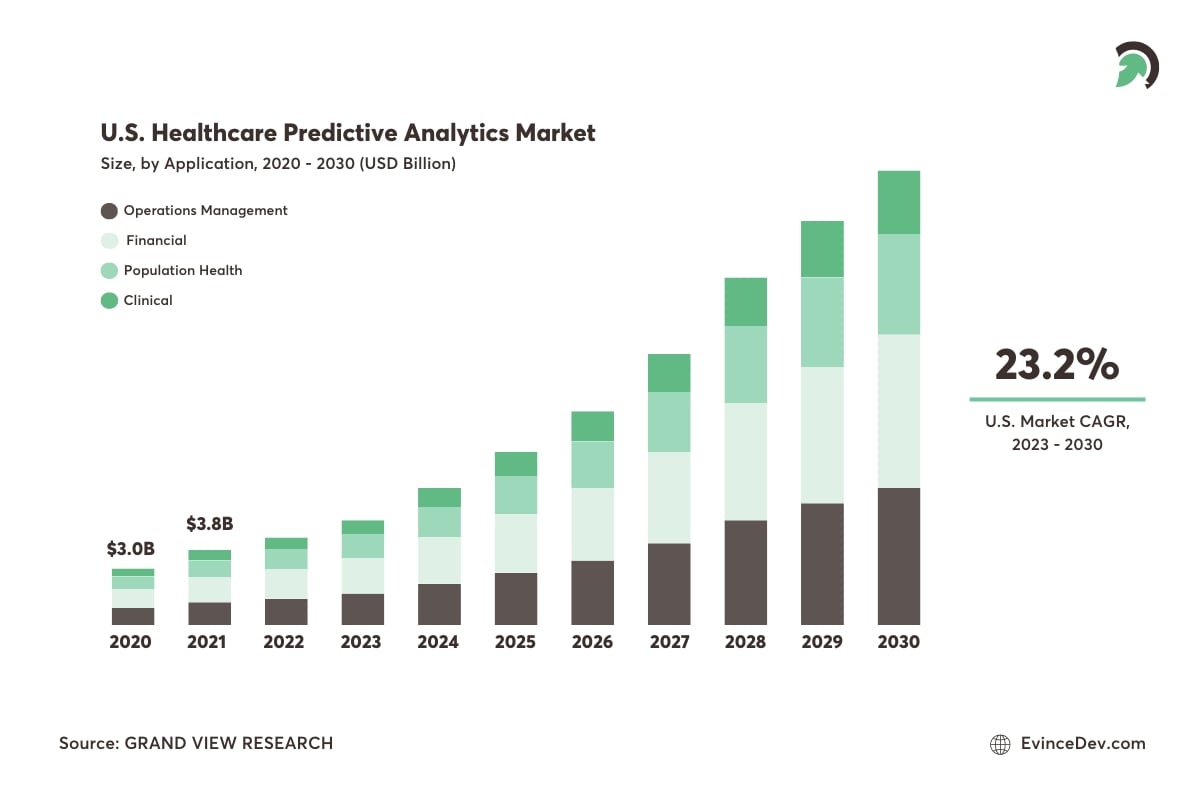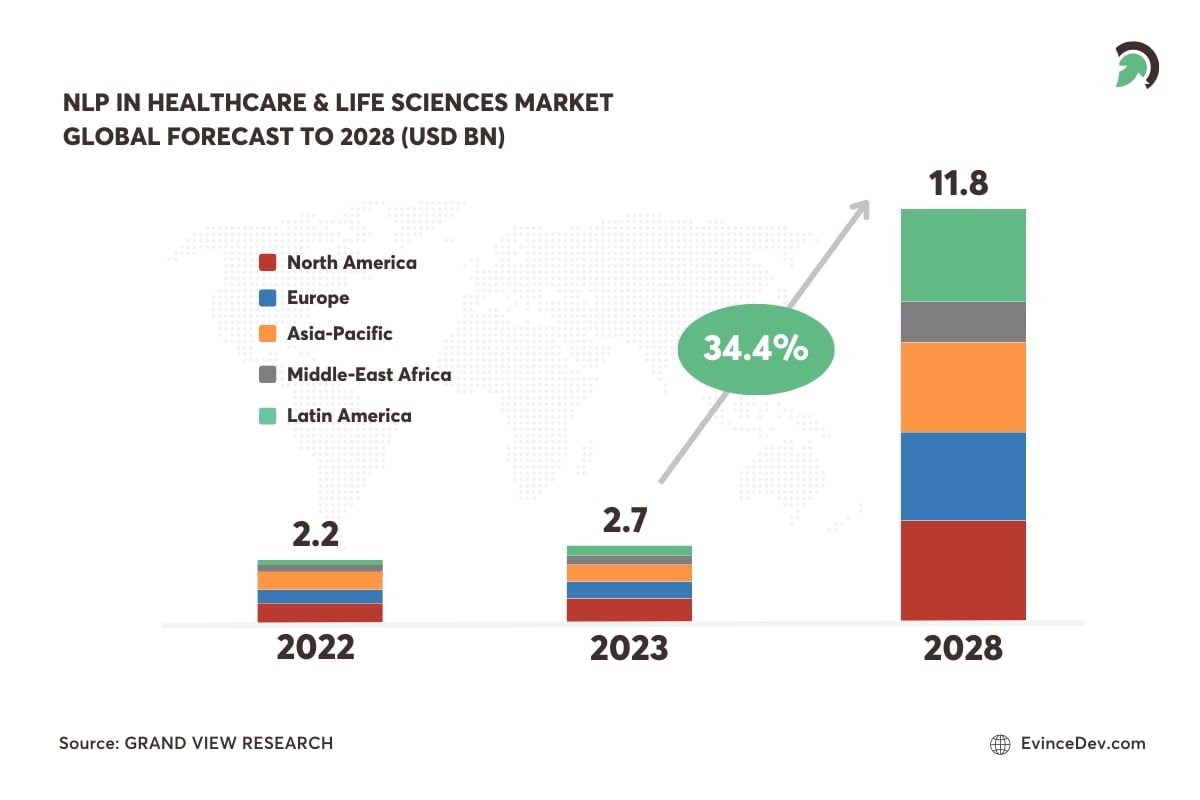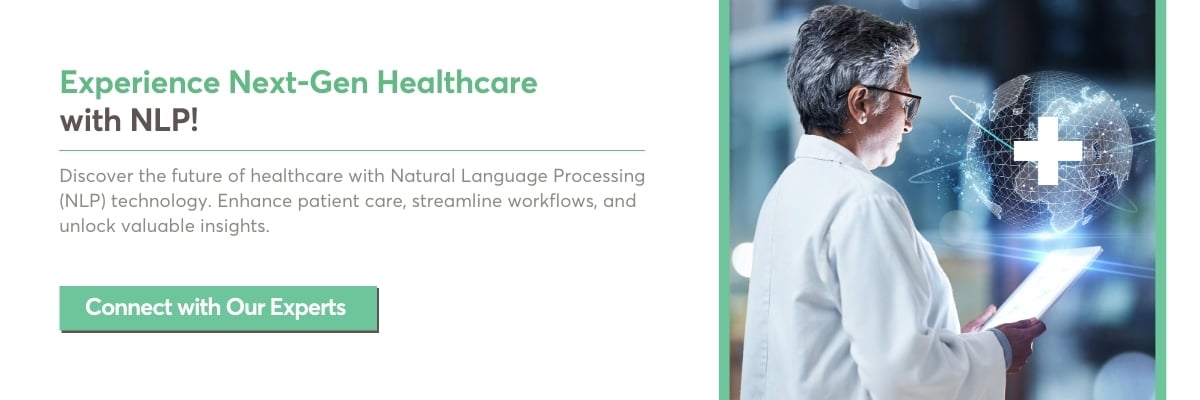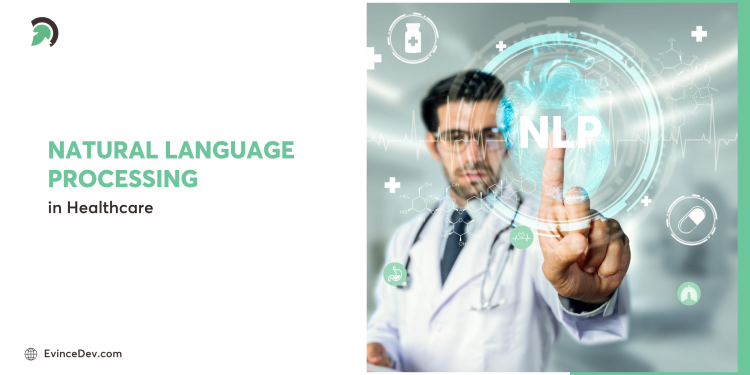The healthcare industry is witnessing a surge in digital transformation, and Natural Language Processing (NLP) is at the forefront of this revolution. NLP empowers computers to understand and process human language, unlocking a vast potential for improving patient care, streamlining workflows, and optimizing outcomes.
Imagine custom mobile healthcare solutions that leverage NLP to analyze medical records, personalize treatment plans, and enhance patient engagement. This is the future NLP is shaping.
What is NLP in Healthcare System?
NLP acts as a bridge between human communication and healthcare data. By analyzing medical reports, physician notes, and patient interactions, NLP software can extract valuable insights, predict potential health risks, and even aid in drug discovery. Predictive analytics for healthcare is becoming more and more popular worldwide.
But in 2022, its market worth was $11.7 billion. Its compound annual growth rate is expected to be at 24.4% between 2023 and 2030.

This technology is poised to significantly impact the healthcare landscape, making NLP software development a strategic investment for forward-thinking organizations.
The Role of NLP in Improving Patient Care and Outcomes
NLP offers a multitude of benefits for both patients and healthcare providers:
- Manages Massive Data Sets with Ease: NLP streamlines the processing of vast amounts of unstructured medical data, allowing healthcare professionals to focus on patient care.
- Empowers Patients: NLP-powered mobile apps can provide patients with real-time access to their medical records, fostering informed decision-making.
- Automates Tasks with RPA and Machine Learning: It automates repetitive tasks such as report generation and data entry, freeing up valuable time for clinicians.
- Enhances Diagnosis and Treatment Planning: NLP helps identify patterns and potential risks, leading to more accurate diagnoses and personalized treatment plans.
- Facilitates Personalized Healthcare: It personalizes patient experiences by analyzing communication and tailoring interventions accordingly.
- Advanced Patient Monitoring & Predictive Analytics: NLP empowers healthcare systems to predict potential health issues and proactively monitor high-risk patients.
The global market for Natural Language Processing (NLP) in the Healthcare and Life Sciences industry is projected to grow from USD 2.7 billion in 2023 to USD 11.8 billion by 2028, representing a CAGR of 34.4% during the forecast period.

NLP Use Cases in Healthcare: Powering Digital Medical Solutions
NLP finds diverse applications within the healthcare domain:
Clinical Documentation Management
NLP revolutionizes clinical documentation by converting spoken language into structured data. It automates the transcription of doctor-patient interactions, making it faster and more accurate than traditional manual methods. It improves healthcare efficiency by reducing clinicians’ time on paperwork, allowing them to focus more on patient care. Additionally, NLP systems can analyze and extract key information from these documents, facilitating better decision-making and continuity of care across different healthcare settings.
Patient Sentiment Analysis
NLP techniques analyze patient feedback from various sources such as surveys, social media, and electronic health records. By understanding patient sentiments and opinions, healthcare providers can identify areas for improvement in services and patient care experiences. Sentiment analysis helps detect trends, monitor patient satisfaction levels, and respond promptly to patient concerns or issues. This proactive approach enhances patient engagement, satisfaction, and loyalty toward healthcare services.
Clinical Trial Management
NLP is crucial in managing clinical trials by extracting and analyzing vast amounts of unstructured clinical data from medical records, trial protocols, and research literature. It automates the identification of eligible patients, streamlines the recruitment process, and enhances patient stratification based on specific criteria. NLP tools assist in monitoring adverse events, ensuring compliance with regulatory requirements, and analyzing trial outcomes more efficiently. By accelerating data-driven decision-making, NLP improves the speed and cost-effectiveness of clinical trials while maintaining high patient safety and data integrity standards.
Medical Coding and Billing
NLP automates medical coding and billing by converting physician notes, procedure descriptions, and diagnostic information into standardized codes required for reimbursement and compliance. Automation reduces errors, improves coding accuracy, and accelerates the billing cycle, leading to faster payments and improved revenue management for healthcare providers. NLP algorithms continuously learn and adapt to evolving healthcare coding standards and regulatory changes, ensuring that healthcare organizations remain compliant and financially viable in a complex reimbursement landscape.
Drug Discovery
NLP transforms drug discovery by analyzing vast amounts of biomedical literature, scientific articles, patents, and clinical trial data. Natural language processing algorithms extract and synthesize relevant information about potential drug targets, molecular interactions, and therapeutic outcomes. By identifying hidden patterns and relationships in complex datasets, NLP accelerates the identification of promising drug candidates and facilitates hypothesis generation for further research. Data-driven approach enhances research productivity, reduces time-to-market for new therapies, and contributes to advancements in personalized medicine and treatment innovations.
Automated Registry Reporting
NLP streamlines clinical data reporting to health registries by automating data extraction, transformation, and loading (ETL) tasks. It ensures the timely and accurate submission of required data elements to regulatory bodies and public health agencies. NLP algorithms can handle structured and unstructured data sources, improving the completeness and reliability of registry submissions. Automating tasks and reducing errors lets healthcare organizations focus on data analysis, quality improvements, and better patient outcomes.
Speech Recognition
NLP-driven speech recognition technology converts spoken language into text, enabling healthcare professionals to create accurate and detailed clinical documentation in real-time. It transcribes medical dictations, patient consultations, and surgical notes with high accuracy and speed, improving documentation efficiency and workflow productivity. Speech recognition systems integrate with electronic health records (EHRs) and clinical information systems, making patient information accessible and searchable. By reducing transcription costs and turnaround times, NLP-powered speech recognition enhances communication among healthcare teams, supports clinical decision-making, and enhances the overall quality of patient care delivery.
Root Cause Analysis
Root Cause Analysis is an advanced thing about NLP because it helps figure out why certain health problems are happening. NLP with digital records reveals health patterns in groups based on location or race, impacting their health outcomes. Regular databases can’t look at how culture and society impact health on a big scale like NLP can. It’s like a whole new way to learn about health problems!

Implementing Predictive Analytics In Healthcare
Using Predictive Analytics in Healthcare can help doctors find patients who are at high risk of getting sick. It can also make it easier for doctors to figure out what’s wrong with a patient. By using Predictive Analytics and Natural Language Processing together, doctors can make better predictions about a patient’s health.
It is crucial for emergency departments to have prompt access to complete data. For example, a delayed diagnosis of Kawasaki disease (KD) can result in serious cardiac complications.
Scientific findings indicate that an NLP-based algorithm (KD-NLP) identified at-risk KD patients with a sensitivity of 93.6% and specificity of 77.5% compared to manual clinician note reviews.
The healthcare sector can greatly improve care delivery and operations but must enhance data capabilities before implementing NLP tools. Better clinical decision support and patient health outcomes will ultimately depend on natural language processing and other machine learning tools.
Unleashing the Power of NLP with NLP Software Development Companies
NLP presents a transformative opportunity for healthcare. By partnering with an experienced NLP software development company like EvinceDev, you can leverage the technology to develop custom mobile and digital healthcare solutions that empower patients, optimize workflows, and revolutionize care delivery. Contact us today to explore how NLP can unlock a new era of healthcare excellence.




